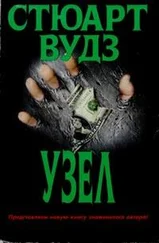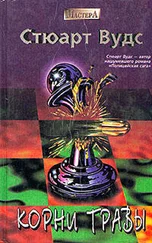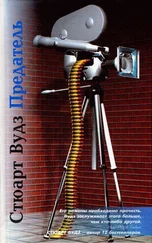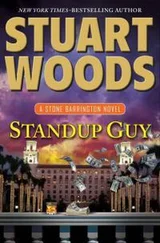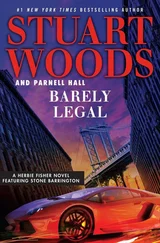“What is it this time?”
“It’s Elroy, the black cook.”
“What about him?”
“He’s got to be Peg Parsons’s source!”
“Why do you say that?”
“Because he hates Sykes.”
“How can you tell?”
“It’s obvious, trust me.”
“What’s Elroy’s last name?”
“Hubbard.”
“Do you know anything about his background?”
“He’s retired Navy, where he was a cook — supposedly his last posting was as the chef at the officers club at Naval Air Station Pensacola.”
“I’ll check him out,” Tom said, glancing at his watch. “I’ve got to get home.”
“Is Amanda keeping you on a short leash?”
“You could put it that way,” he said.
She walked him to the door.
“Anything else to report?”
“Nope. Drive carefully.” She let him out and locked the door behind him. She walked slowly back to the sofa. “Elroy,” she said. “Now, whose team is he playing on?”
Tom found Amanda sound asleep, so he wouldn’t have to make love for a third time today. He lay on his back, naked, cooling down, and thought about Elroy Hubbard.
Who did he represent in Sykes’s camp?
There were options: he could simply be a source Peg Parsons had cultivated after a chance meeting. Or he could be CIA — they were never shy about trampling on his territory. Or one of the fifteen other intelligence agencies. Not the NSA: too technical. Then who would want what Hubbard had on Sykes? A state agency, maybe?
It took him an hour to sink into sleep, finally, after ten milligrams of Ambien. The following morning he was groggy, as he had known he would be after seeking pharmaceutical help so late. He took a cold shower to wake him sufficiently for action. But what action? He was running Elizabeth Potter as a one-off; there was no team to back her up, just himself. He contemplated creating a team, but he didn’t want anyone to know he was running an agent alone — it would be embarrassing to ask for help at this late date, especially when the life of a president-elect was in play. And he didn’t like admitting that he was working with the Secret Service, rather than with his own Bureau.
He called Mamie Short. She was experienced, inventive, and distrusted by most of the male agents because she was a female agent. There was still resistance to that in the Bureau.
He used his private line to call her on a direct line, avoiding secretaries.
“This is Short,” she said.
“Mamie, Tom Blake. I need to see you outside the office, without our being seen together. Any suggestions as to where?”
“How about my office? This place empties out at noon, like a herd of cattle avoiding branding.”
He thought about that; not a bad idea. “Is there a conference room with a lock on the door?”
“Two doors from my office.” She gave him a room number. “Twelve-fifteen?”
“Good.” He hung up.
At twelve-ten he walked two floors down the stairs and found the room. She was sitting at the table, munching on a sandwich.
“I brought you one,” she said, indicating a brown paper bag at the next seat.
“Thanks, Mamie.” He sat down and took a moment to think about her while unwrapping his sandwich. She was tallish, blond, early forties, casually dressed. Hoover would have hated her on sight.
“I’ve been running an agent on my own, and I need help.”
“And you had to come two floors down to get that?”
“For a variety of reasons, I don’t want to assemble a team.”
“And you don’t want to tell me what your reasons are?”
“If it becomes relevant, I will.”
“Okay, I’ll trust your judgment on relevance.”
“Thank you. Do you know an agent named Elizabeth Potter?”
“Late twenties, a looker, smart?”
“That’s a start.”
“I met her once socially, and we had a little chat.”
“How little?”
“Superficial, I should have said. She asked my advice.”
“On what subject?”
“We had been talking about women in the Bureau, and she said, ‘Any advice?’ We were interrupted before I could give her any.”
“There’s a small group of white supremacists in Virginia, run by a man named Wade Sykes.”
“Him, I’ve heard of: retired colonel, sort of drummed out of the Army for promoting his views too obviously.”
“That’s the one.”
“How’s Elizabeth doing?” Mamie asked.
“Pretty good: she’s in, but our problem is communicating. There’s no cell service at their compound and they only turn on the Wi-Fi twice a day, apparently at random times, so if I e-mail her, posing as her father, I never know when she’ll get it.”
“Okay, how can I help?”
“We’ve learned — let me rephrase that — we’ve heard from a journalist who has somebody inside, too. Elizabeth thinks she knows who — a black cook, using the name of Elroy Hubbard, whose legend is retired Navy cook, last assignment at Naval Air Station Pensacola, as chef at the officers club. I need you to run that name through the mill and see if that legend has roots, or is he just making it up. If somebody’s running him, I want to know who, and I need at least one name.”
“Okay, anything else?”
“Since what I’ve told you is everything, you and I know everything else.”
“Why does Potter think he’s Parsons’s guy?”
“I didn’t say it was Parsons.”
“Oh, come on, Tom. You two were an item at Georgetown. I was there, too, remember?”
“Oh, yeah.”
“Not that we knew each other well. Your time was taken up with Parsons.”
“Okay, it’s Peg. I have to keep that very quiet, because my wife’s eyeballs bulge whenever her name is mentioned.”
“Why are you even in touch with her?”
“I needed to plant a story in her column for cover.”
“And she did that for you?”
“Yes.”
“And what did she get out of it?”
“Mamie...”
“She had a reputation at Georgetown.”
“Put her out of your mind,” Tom said firmly. “Got it?”
“Okay, I’ll use my imagination.”
“Don’t even do that.”
Mamie recapped her pen. “Anything else?”
He scribbled a number on a blank card. “This is a burner phone. Leave a message there on how to reach you or see you.”
She handed him a card. “No need. This is my burner.”
Tom tucked it into a pocket.
“You want me to text you information?”
“If it’s urgent. Otherwise, I’d rather talk face-to-face.”
“You think you can read me better that way, Tom?”
“Don’t be a smart-ass, Mamie.”
“But I’m so good at it!”
“Thanks for the sandwich.” He hadn’t touched it. He put it back in the bag and took it with him, then ate it at his desk.
As Stone’s G-500 pulled up to Jet Aviation at Teterboro, a three-car line of black SUVs rolled up to the wingtip. He turned to Holly. “Does the caravan mean you’re not coming back to my house?”
“How observant you are,” she said, pinching his cheek. “It’s better if I establish a routine at the Carlyle and my transition office. Don’t worry, I’ll soon long for your touch.”
“That can’t come soon enough for me.”
The stewardess opened the airstairs door and they parted at the bottom as Stone’s luggage was loaded into the Bentley and Fred stood by. Holly was followed to the SUVs by her luggage and a large stack of cardboard cartons, looking like an attorney going to a very complicated trial. Soon, they were both on their way to the city by different routes, Holly via the George Washington Bridge, Stone via the Lincoln Tunnel.
Stone picked up the phone and called Dino.
Читать дальше

